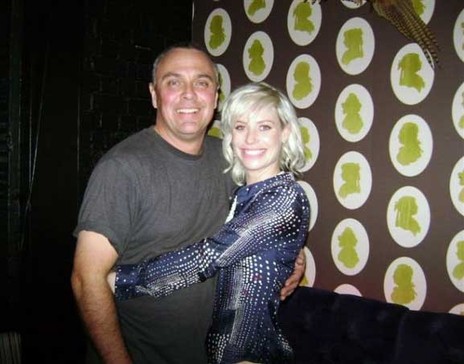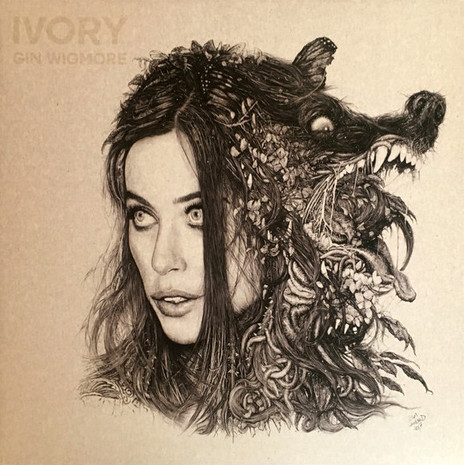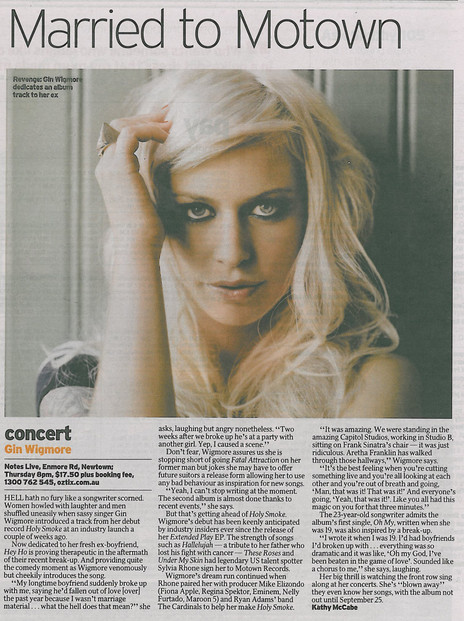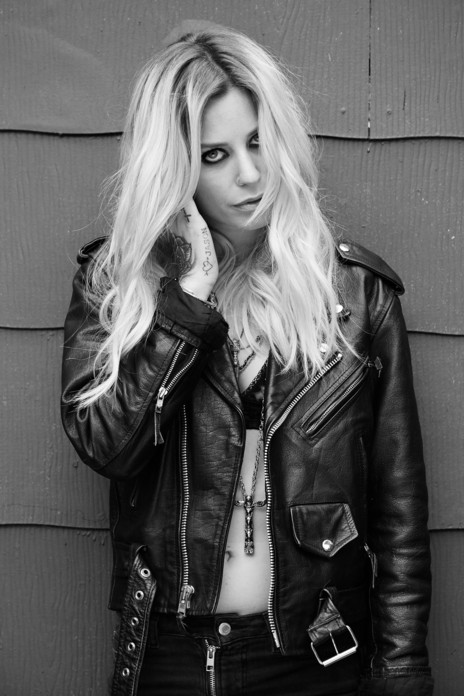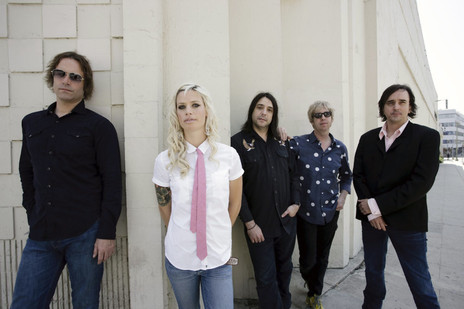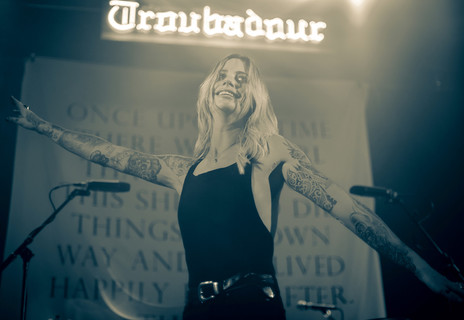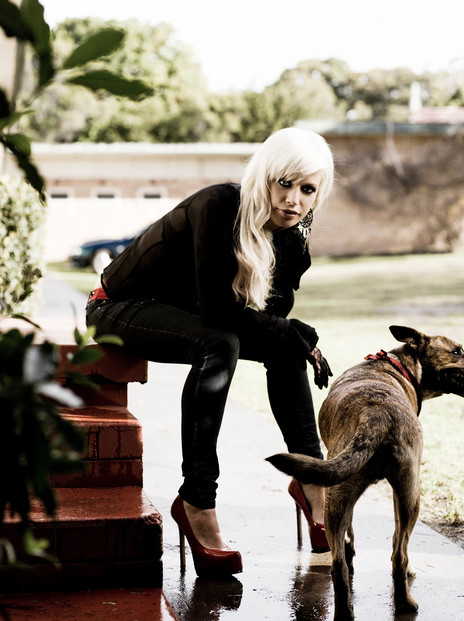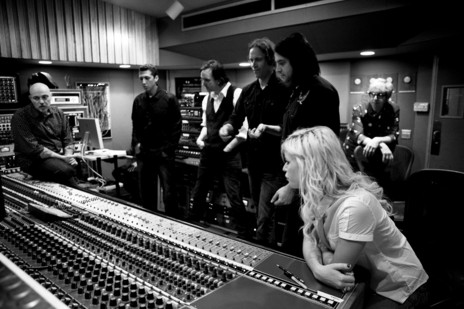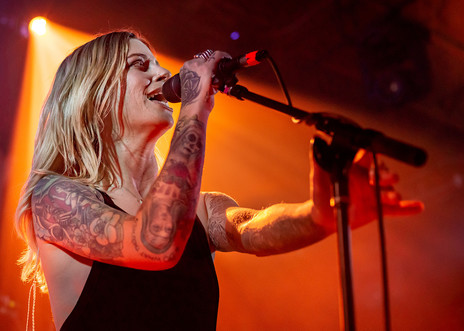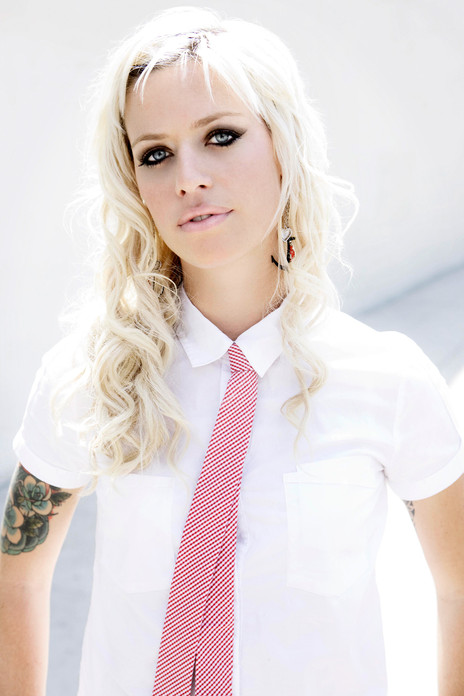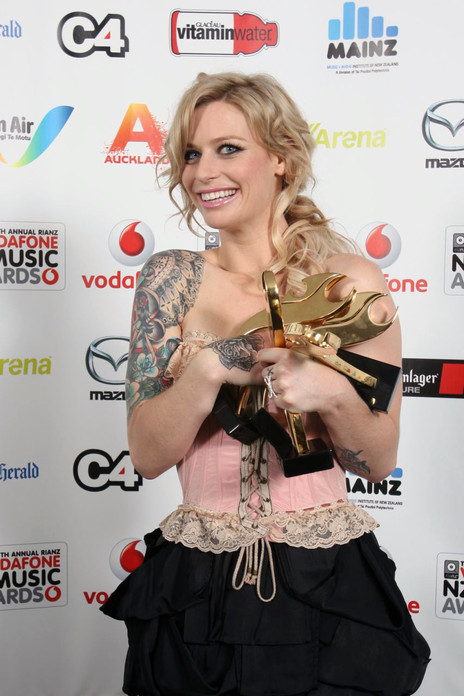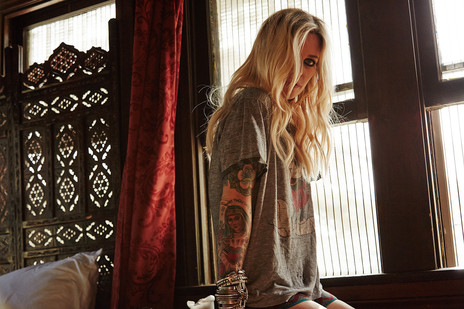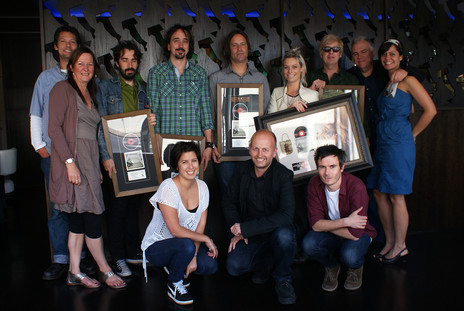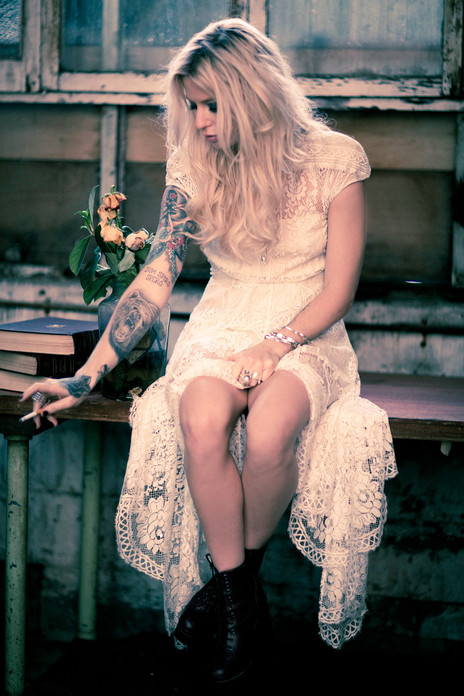Wigmore was no reality TV star, nor label-made pop ingénue. She was a girl from Devonport who impressed the world with a song about her father’s tragic passing, winning the grand prize in the International Songwriting Competition at the age of 17 for ‘Hallelujah’.
Born in 1986, she began strumming the guitar and coming up with lyrics as a teenager. She discovered her father’s guitar at 14, and soon started hunting down opportunities to play live, often sneaking into open mic nights at Temple Bar on Queen Street despite being underage.
Right from the get go, Wigmore was the kind of girl who thought if she was going to bother doing something, she’d go all in.
One of a number of passionate music students coming through Takapuna Grammar School in the early 2000s (Finn Andrews and Sophia Burn of The Veils, and The Checks are also TGS alumni), she was guided towards Rikki Morris’ studio The Bus, at The Depot in Devonport, to lay down some demos. Even in those very early days, you could hear the promise of her songs – one called ‘Angelfire’, written when she was 14 won her first prize in the teen category of the International Songwriting Competition.
Wigmore fell in love with music, partly because it gave her the chance to lark around with her mates and hang out in bars, but also because it came naturally.
Her older sister Lucy entered ‘Hallelujah’ in the International Songwriting Competition on Gin’s behalf.
But when her dad suddenly passed away from cancer when she was 16, writing songs didn’t feel so important. She wrote the heartfelt and heartbreaking ‘Hallelujah’ for his funeral, but that was for personal catharsis rather than public consumption – Wigmore no longer thought music was a likely career at that point.
Her older sister Lucy entered ‘Hallelujah’ in the International Songwriting Competition on Gin’s behalf. She won the grand prize, taking away US$10,000 and another $30,000 worth of merch and prizes, including a full scholarship to Berklee College of Music's Summer Performance Program.
Though the win made Wigmore reconsider a career in songwriting, she didn’t immediately settle down to make music full time.
For three years she travelled, studied religion, moved to Taranaki, studied teaching, went to Europe, and moved to Australia before deciding to give music a proper go.
From there, things moved rapidly. She was signed to Universal Music New Zealand and then to Island Records Australia (the first artist on the new division of the label), and put out her first EP entitled Extended Play in 2008. She toured mostly supporting other artists – Pete Murray, Sheryl Crow – but quickly became a household name in New Zealand through an Air New Zealand advertising campaign.
That was the first inkling that synchronisation of Wigmore’s songs would play a significant role in her exposure and popularity, not just at home but globally, to the point where she’s now known in industry circles as “queen of the synch”.
Over the past seven years, as she’s released three full-length albums (Holy Smoke in 2009, Gravel & Wine in 2011, and Blood to Bone in 2015) Wigmore has had her songs placed in a wide variety of TV shows and ad campaigns. The Good Wife, Grey’s Anatomy, and Revenge, along with ads for Guinness Black Lager, Heineken (in a tie-in commercial with the James Bond film Skyfall), and trailers for films like Whiskey Tango Foxtrot, The Other Woman and Mother’s Day, are just a few instances where global audiences have been exposed to Wigmore’s ear-worm tunes and husky tones.
Stylistically speaking, Wigmore takes influence from rock and roll, country, blues, soul, Americana, and pop – there’s a classic sound to her work, and a consistency of driving rhythmic patterns throughout her albums. But each of the three has a different flavour sprinkled on top. Holy Smoke has a slightly theatrical quality, a little jangly and occasionally lilting; Gravel & Wine has a southern states feel, combining sassy day-of-the-dead mariachi attitude with inspiration from Mississippi, old noir films, and spaghetti westerns; and Blood to Bone sees her going for a bold, raw sound, with hints of hip hop and electronica thrown into the mix.
If there’s one thing that unites them, however, it’s the attitude: always spirited and drawing on her real-life heartbreaks and triumphs.
“I think that’s something that unites us all. We’ve all felt like, ‘f**king shit went down and we're pissed about it,’ ” she laughs, when discussing her lyrics.
Being rebellious and non-conformist also comes up with some frequency in her songs.
“I don’t ever wanna be a lady,” she sings on ‘Mr Freakshow’ from Holy Smoke, and ‘Black Sheep’ from Gravel & Wine has the line, “Everybody’s doing it so why the hell should I?”
“It's meant to be a fun song, but you know, it’s describing being different in a funny, lighthearted way. Being a black sheep is a way I would describe myself. I don’t like trying to fit in.”
She’s become more even personal on Blood To Bone, wanting to create something bold and vulnerable that didn’t hide behind a character, and took her somewhere less comfortable.
“My manager said something to me when we were making Gravel & Wine, which stayed with me. Before I finished it, we were talking about the album, and he said he didn't hear anything that sounded like I'd really bled for the album. Sweated maybe, but you needed to hear me bleed. So I went and wrote ‘If Only’, which felt like bleeding to me.
“With Blood To Bone I felt like I wanted to go deeper again, I went to the bone. So, hence the album title.”
With ‘Blood to the Bone', Wigmore “wanted to go deeper again, I went to the bone. hence the album title.”
She was particularly inspired by a close-up photograph of herself (which became the album cover) taken by Lee Jeffries, a renowned artist who mostly documents homeless people, whom Wigmore specifically sought out.
“You can see every little pore, every wrinkle, every line and mark, and it's like a road map of my life on my face. So I saw that rawness in my face, and I wanted to spread that across the music. I think with the music, I was sick of having things in there that were covered up. So if it was trying to be hidden in the track, then take it out. It was about getting rid of any bullshit.”
That no bullshit attitude has also meant while Wigmore’s career has been international from the beginning (she lives in Los Angeles and spends a good portion of every album cycle touring the world) she’s remained grounded and avoided the self-combustion that many rising young stars face.
She’s also remained devoted to New Zealand, with many national tours, as well as performing at events like the Big Day Out, Winery Tour, and at the public post-match party for the All Blacks World Cup win in 2011.
That dedication to her local fans, along with songs that effortlessly showcase her firecracker personality, have earned her six New Zealand Music Awards and several multi-platinum singles and albums.
She was also part of a new wave of strong, independent, female artists coming out of New Zealand who weren’t afraid to say what they liked, dress how they liked, and ignore anyone who tried to tell them how to play the game.
Sweet, polite, and demure, Wigmore is definitely not. Unapologetically forthright, with a huge laugh and a penchant for swearing like a sailor, is more her style.
Her NZ Music Awards acceptance speeches have always been a hoot. In 2015, a friendly, comedic rivalry between herself and Anika Moa developed in the lead up to the awards, and when Wigmore won Best Female, she cackled “Up yours Anika” and flipped her the bird from the stage, before going on to dedicate the award to her fellow nominees.
She also made headlines in 2015 for her direct and sassy response to an online troll posting negative remarks on her Facebook page, whom she tactfully reproached for his behaviour.
It’s this particular combination of being genuine and approachable as well as fierce that’s made Wigmore popular with all age groups, and fans of a variety of genres. You’ll often see multiple generations of the same family at her shows, and an equal gender balance, which is a key factor in her enduring appeal.
Wigmore’s utmost professionalism has also been important. Musicians who play with her (which have included Ryan Adams’ band The Cardinals) often describe her as a perfectionist, and she’s always been particularly good at coping with media and press. She’ll frequently roar with laughter in an interview as she lets a journalist in on some wild hijinks, but she has always been smart enough to avoid completely giving away her privacy.
While it’s clear Wigmore does what she does because she loves it, she’s also become an important figure in our musical landscape by proving it’s entirely possible for a young woman from New Zealand to create a sustainable international music career based solely on her songwriting talent, her unique voice, and desire to evolve.
“I want a long career in music, so you've gotta keep trying things out; it's gotta get progressively better. Like I don't know if I've become a better cook or a better lover over the past two years, but I know I've become a better musician.”
– Lydia Jenkin, 2016
--
Gin Wigmore’s fourth studio album Ivory arrived in April 2018, after 18 months of her drip-feeding five punchy new singles – ‘Dirty Mercy’, ‘Hallow Fate’, ‘Beatnik Trip’, ‘Cabrona’ and the highly celebrated ‘ Girl Gang’. The album shared the same name as her first-born son, although Wigmore and her husband, American rock musician Jason Butler, renamed the baby Pascal when he was one year old. Wigmore described the new work as “… the vulnerable expression of lyrics and the cathartic nature of melodies that makes the process of making an album so uniquely awesome.”
Advice to young artists: “Retain your rights, retain your touring, retain your merch and keep it short.”
Ivory peaked at No. 11 on the New Zealand album charts and enjoyed a US and New Zealand tour. Reviewing for NZ Musician, Erica McQueen described Ivory as a “funky, surprisingly poppy offering, witnessing perhaps a more mainstream, or at least retro stage in the evolution of Gin’s sound”.
“It’s clear that lyrically, Ivory is a commentary on feminism, empowerment and returning to your roots. Equally, it’s about having a great time in the studio with what sounds like a very good production team.”
Ivory was in some ways the end of an era, as it was her last album with a label before going independent for the first time in her career. Discussing the move on RNZ’s The Mixtape in early 2021, Wigmore described major label contracts as “shackles”.
“I think the contracts are too long, and that’s where they’re archaic. They lock you in, like a sentence. Your personality as an artist evolves, you get smart quicker than a five-album deal … you’re not nurtured to grow.”
Wigmore’s life now certainly does seem to be the product of freedom – the freedom to do whatever she wants. She’s a wife, a mother of two boys, the owner-operator of a boutique hotel in Palm Springs, and still an ardent musician and songwriter. She regularly self-releases new singles, with the promise of a new album in 2022, and often returns to New Zealand for touring from her base in Los Angeles.
Looking back on her career with Universal and Island Records, there is good feeling. “I had a great ride … I was fortunate enough to have a really good team around me. I still think that Adam Holt at Universal is a wonderful man.” she told RNZ in 2021.
“I was able to do so many things on their dime that I would otherwise never have been able to do, which is absolutely what launched my career, 100%. Going to the States – I would never have been able to do that without them.”
And as for new artists?
“I do think it’s a good thing to strive for … I would just say that you [should] retain your rights, retain your touring, retain your merch and keep it short. Do one album, two albums, get hella’ money to do as much shit as you can on their dime, and then peace out!”
– Update by Rosie Howells, February 2022
